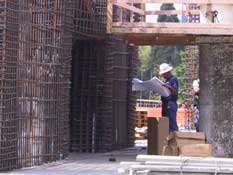|
|||||
Become a
›› Introduction -------------------------------- Inspection Courses Reinforced Concrete: Structural Ultrasonic Technician Magnetic Particle Testing Level II Special Inspector Certification Renewal Lateral Framing Special Inspection Proprietary Anchors Inspection WAQTC |
Types of Work |
||||
In addition to field personnel, testing laboratories must maintain a strong staff of laboratory, office, and support personnel. Pick-up drivers are employed to drive from site-to-site to gather test specimens made by field inspectors. Laboratory technicians are necessary to login, store and break concrete test cylinders, as well as complete dozens of tests on soil, aggregate, and asphalt. Laboratory Technicians have additional certification requirements; see the ACI Website for more details. In the office, dispatchers take phone calls from contractors requesting inspections and allocate the available personnel to perform the work based on availability, licensing, and experience. There are often clerical tasks as well, from billing and mailing, to data entry and coordination of license renewals, testing, and coursework. Work Environment: Inspectors must often climb ladders and work in elevated areas, often using personal protective equipment. Inspectors, as with all construction personnel will be expected to wear long pants, sturdy footwear and appropriate shirts. Hard-hats, high visibility vests and safety glasses are generally provided by the testing lab. While larger projects will require constant, full time inspection, many others may only require personnel to be on site once per week. Inspectors can expect to see a diverse number of projects and may expect a wide variation in work hours—both in terms of daily starting and quitting times, and in total hours per week. It is not uncommon for work to slow down due to cold and inclement weather in the wintertime with heavy overtime in the summer. Employers: Similarly, many labs will pay for or reimburse inspectors for coursework, exam and interview fees, license renewals and codebooks. Medical, dental and vision benefits are generally universal, however, each employer will offer different packages with potentially wide variations in employer contributions. For more information, see the NWCEL Partner Labs page. Employment Outlook: |
|||||








 The most senior special inspection personnel, those who have accumulated the most licenses and have the greatest project experience generally move into positions of management. Field Supervisors and Technical Directors are WABO licensed personnel who are qualified to provide technical guidance and ensure competence of field personnel. Field supervisors must have five years experience as special inspectors and supervise inspectors holding the same types of licenses that they hold themselves. Technical directors must be licensed professional engineers or have the endorsement of several engineers, have 8 years of special inspection experience and have been a field supervisor of at least two disciplines. Technical Directors are part of the key management team, along with the Supervising Laboratory Technician.
The most senior special inspection personnel, those who have accumulated the most licenses and have the greatest project experience generally move into positions of management. Field Supervisors and Technical Directors are WABO licensed personnel who are qualified to provide technical guidance and ensure competence of field personnel. Field supervisors must have five years experience as special inspectors and supervise inspectors holding the same types of licenses that they hold themselves. Technical directors must be licensed professional engineers or have the endorsement of several engineers, have 8 years of special inspection experience and have been a field supervisor of at least two disciplines. Technical Directors are part of the key management team, along with the Supervising Laboratory Technician.